General Panikhida
2023: Year in Photos
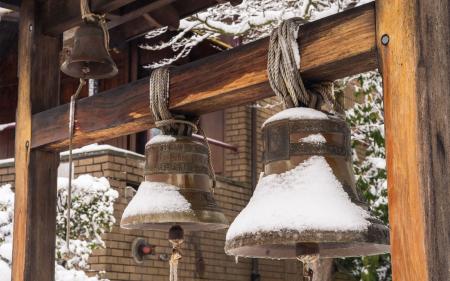
By God’s grace, St Vladimir’s Orthodox Theological Seminary (SVOTS) was blessed with a student body of 97 seminarians and saw several exciting new initiatives begin in 2023. A few highlights were: the launch of the St Vladimir’s Online School of Theology, rebuilding seminarian scholarship funds on Giving Tuesday, and the inauguration of the Light of the World Webinar Series. As always, the primary mission and focus of St Vladimir’s Seminary continues unchanged: to train priests, lay leaders, and scholars to be active apologists of the Orthodox Christian Faith—focusing on academic rigor and spiritual formation within a residential Orthodox community.
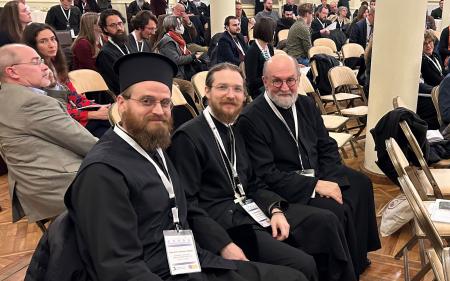
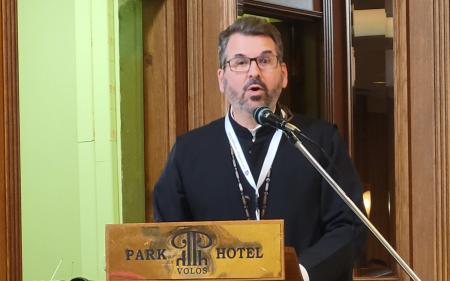
JANUARY: Seminary faculty and two students represented SVOTS at the International Orthodox Theological Association (IOTA) 2023 mega-conference (Jan 12-14) in Volos, Greece, alongside over 400 other lay scholars, clergy, and hierarchs hailing from 45 different countries; the conference theme was “Mission and the Orthodox Church.” Pictured above are Seminary President, the Very Rev. Dr Chad Hatfield, Fr Anthony Gilbert (M.Div. ‘23), Fr Alexander Earl (M.Div. ‘23), and the Very Rev. Dr Sergius Halvorsen during his presentation.
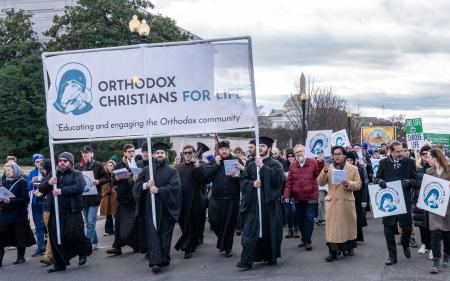
JANUARY: A large group of seminary faculty, staff, and students traveled to Washington D.C. for the annual March for Life.

JANUARY: His Eminence, the Most Reverend Daniel, Archbishop of Chicago and the Diocese of the Midwest (OCA) led the SVOTS community in celebrating the Synaxis of the Ecumenical Teachers and Hierarchs, Basil the Great, Gregory the Theologian, and John Chrysostom, the patronal feast of the campus chapel.
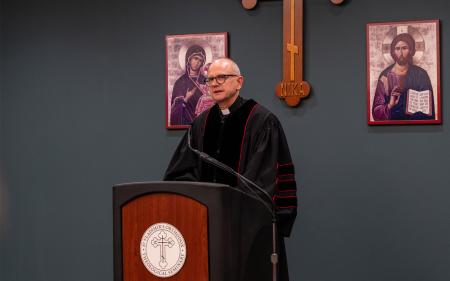
JANUARY: The 40th Annual Father Alexander Schmemann Memorial Lecture was given by the Rev. Dr Hans Boersma, Professor of Ascetical Theology at Nashotah House, who spoke on “God as Embodied: Christology and Participation in Maximus the Confessor.”
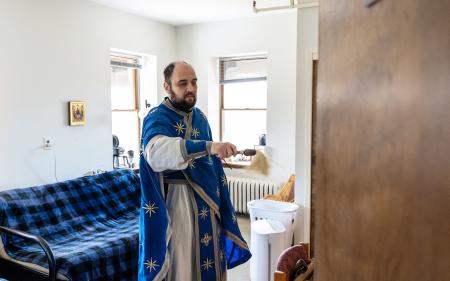
FEBRUARY: Archpriest Bogdan Bucur blesses a dorm room on the Feast of the Meeting of the Lord in the Temple, as the seminary community received “house blessings” across the entire SVOTS campus.
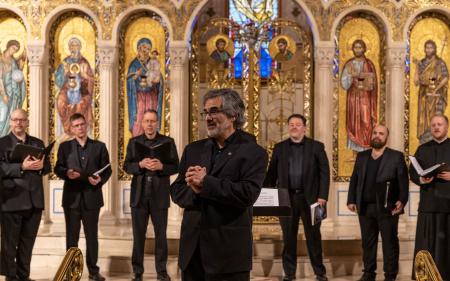
FEBRUARY: The Institute of Sacred Arts (ISA) at SVOTS and Great Music Under a Byzantine Dome hosted a concert performance, The Byzantine Choral Inheritance, by the world-renowned ensemble, Cappella Romana, on Friday, February 17, 2023, at the Archdiocesan Cathedral of the Holy Trinity in New York. Dr Alexander Lingas, founder and Musical Director of Cappella Romana and ISA Artist in Residence for the Spring 2023 semester, directed a portion of the concert.
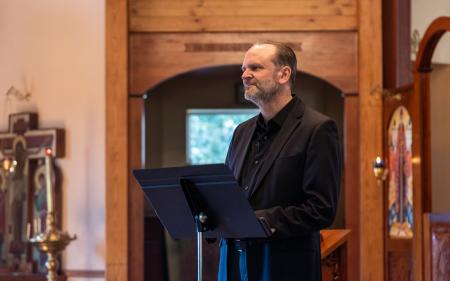
MARCH: Each year, during the first two days of Great Lent, a lenten retreat is held after morning matins, and SVOTS seminarians are encouraged to keep silent, focusing on entering the fast in earnest. This year, Dr Peter Bouteneff presented for the retreat, giving a four-part series of talks titled “The Social Self and the Inner Life: Reflections on Communion, Introversion, Extraversion, and Compassion.”
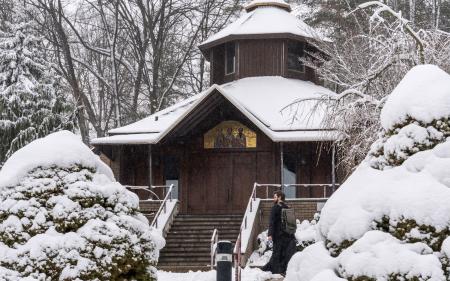
MARCH: A heavy snowfall marked the first two days of Lent in Yonkers, NY this year, blanketing the campus and adding to the prayerful silence kept by the seminary community.
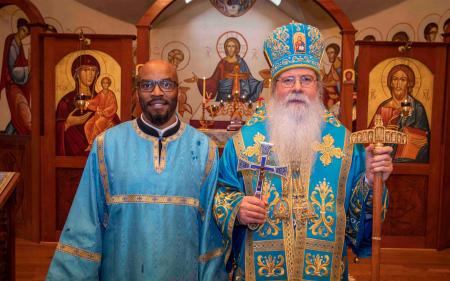
MARCH: His Beatitude Tikhon, Archbishop of Washington and Metropolitan of All America and Canada of the Orthodox Church in America (OCA) served at SVOTS for the Feast of the Annunciation to the Most Holy Theotokos, raising SVS Press Bookstore Manager Anthony Antwian Davis (M.Div. ‘19) to the rank of reader.
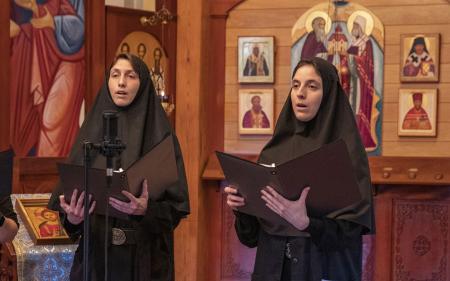
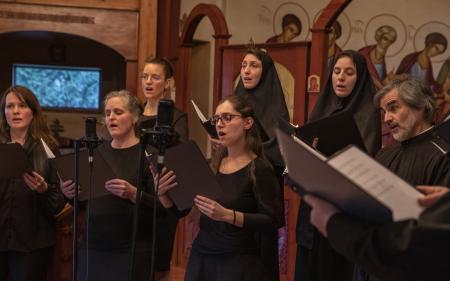
MARCH: Seminary students, faculty, and guests performed a concert titled “Hymns for the Theotokos & the Lenten Season” on Sunday, March 26 in the Three Hierarchs chapel on campus. Three ensembles—a male choir, a women’s choir, and a mixed choir—sang selections of traditional and contemporary hymns from Slavic, Georgian, Middle Eastern, Greek, Malankaran, and modern American composers.
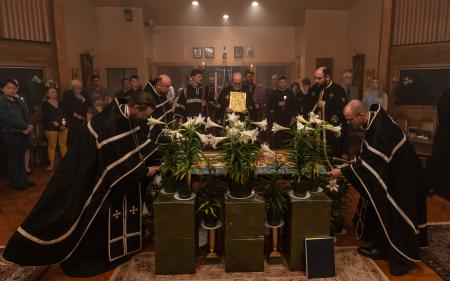
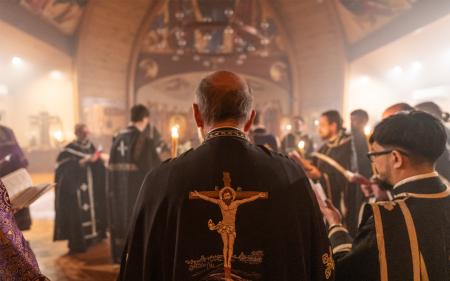
APRIL: Scenes from the Holy Saturday matins service at Three Hierarchs Chapel.
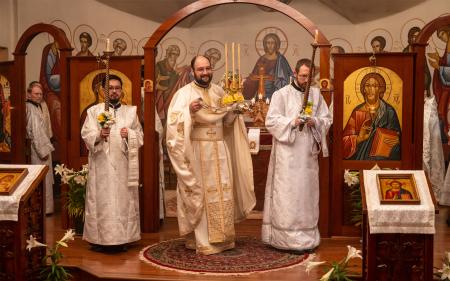
APRIL: Let God arise! Let His enemies be scattered! Archpriest Bogdan Bucur censes the congregation at the Paschal Divine Liturgy.
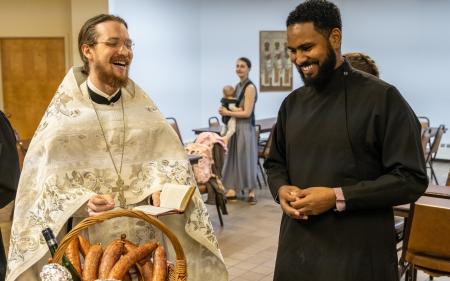
APRIL: Christ is Risen! Fr Alexander Earl (M.Div. ’23) and Dn Tesfay Rezene (Th.M. ‘23) share in the joy of the feast during the blessing of the Pascha baskets.
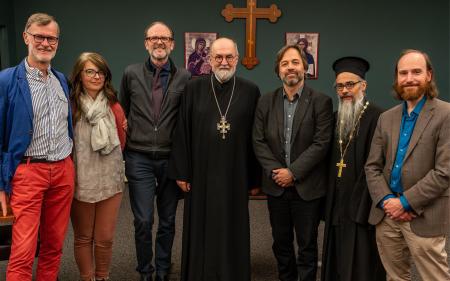
APRIL: The Institute of Sacred Arts hosted a panel discussion entitled “Sacred Arts East and West: A Conversation with Aidan Hart, Jonathan Pageau, and Andrew Gould”, on April 24. The panelists were challenged to present their work and approach to liturgical art from the lens of cultural adaptation and bridge-building. ISA founding director and SVOTS Professor of Systematic Theology Dr Peter Bouteneff and Associate Professor of Art History Dr Rossitza Schroeder moderated the discussion.
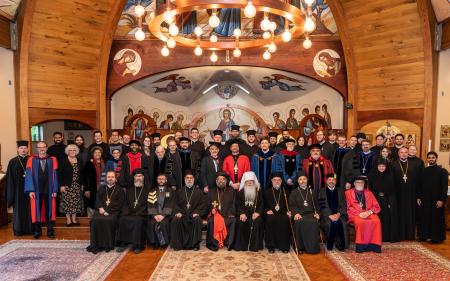
MAY: Commencement—the graduating class of 2023 with His Beatitude, Metropolitan Tikhon, visiting hierarchs, and faculty and trustees of St Vladimir’s Seminary.
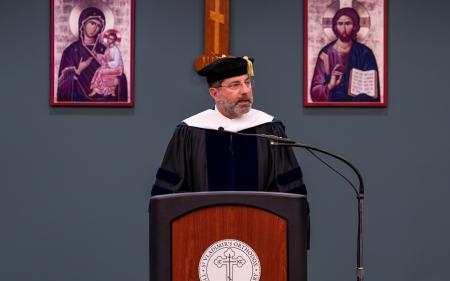
MAY: The Commencement Address was given by the Hon. Alex M. Azar II, who was also awarded a Doctor of Humane Letters, honoris causa, in recognition of his faithful and dedicated philanthropic service over many years within the Church.
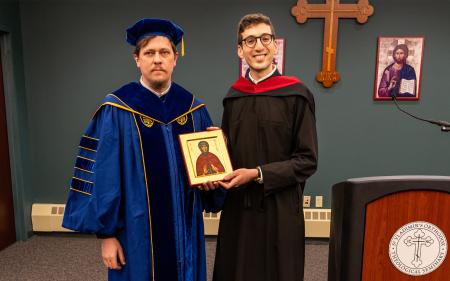
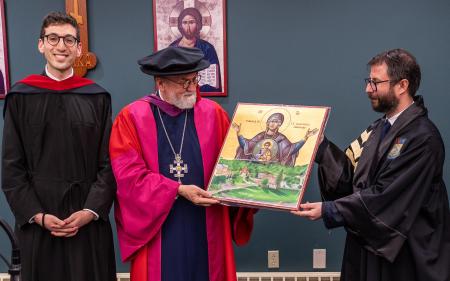
During the Commencement ceremony, Student Council President Mark Sultani (M.Div ‘23) presented the Saint Macrina Award to the Rev. Dn Dr Vitaly Permiakov. The Saint Macrina Award is an honor given each year to a professor elected by the student body to recognize his or her effort and excellence in teaching. Sultani then presented an unexpected and touching class gift to the Very Rev. Dr Chad Hatfield and Academic Dean Dr Ionuț-Alexandru Tudorie, an icon commissioned with a local iconographer, depicting the Mother of God with Christ in her womb overlooking the seminary campus.
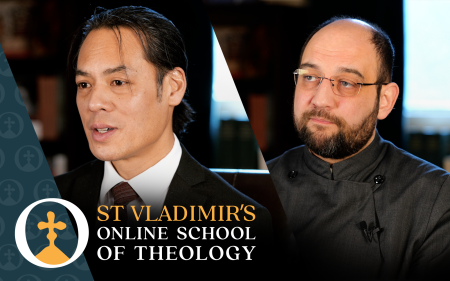
JUNE: Over 400 students joined Preparing to Read the Fathers and Orthodoxy & the Old Testament, the first-ever online courses offered through the St Vladimir’s Online School of Theology, an accessible extension of the seminary offering quality online Orthodox education to the general public, taught by SVOTS faculty. The courses were taught by Dr Michael Legaspi and Archpriest Bogdan Bucur.
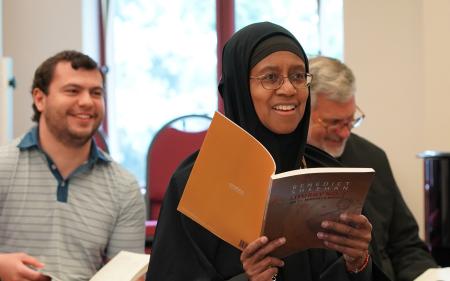
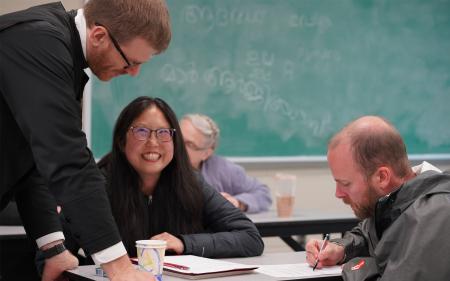
JUNE: A landmark Summer Music Institute was held, with a special focus on composition by contemporary Orthodox musicians. Highlights of the week included Benedict Sheehan’s Liturgy No. 2, rehearsed by participants throughout the week and sung in church for the second time ever on Friday, June 24; and keynote presentations by composers Mother Katherine Weston and Dawn Helene, discussing their own musical journeys and creative processes while introducing attendees to several hymns they had authored. Distinguished Orthodox church musicians Talia Sheehan, Juliana Woodill, and Dn Harrison Russin also gave intensive workshops on vocal technique and choir conducting.
JUNE: Seminary alumnus Archpriest Kirill Sokolov (M.Div. ‘07) led the training of diaconal candidates on campus for the Orthodox Church in America (OCA)’s Diaconal Liturgical Practicum.
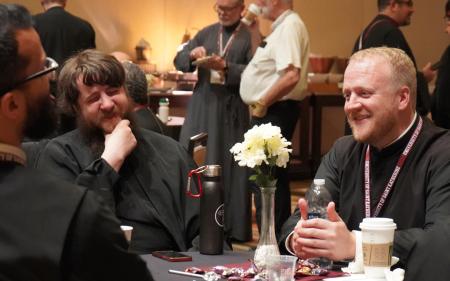
JULY: St Vladimir’s Seminary hosted an alumni reception, sponsored by the Orthodox Vision Foundation, at the 56th Biennial Antiochian Archdiocese Convention in Phoenix, AZ. Over 60 alumni attended the event, reconnecting with former classmates and learning about recent developments in Seminary life.

AUGUST: Education Day was held online via Zoom; the event featured six hours of presentations conducted by SVOTS faculty members, was attended by hundreds online, and raised over $36,000 for seminarian scholarships.
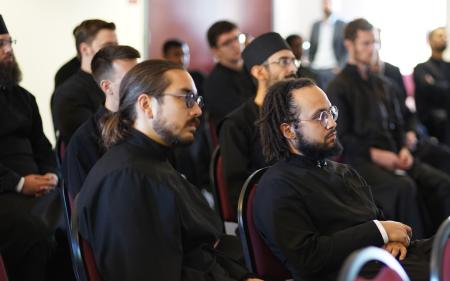
AUGUST: Thirty new seminarians joined the student body at SVOTS for academic year 2023-24, bringing the total enrollment to 93 living on campus; half of that number is joined by their wives and small children.
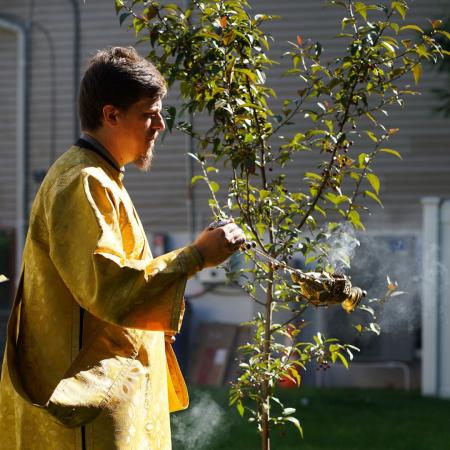
SEPTEMBER: In keeping with a yearly tradition, the seminary community marked the Ecclesiastical New Year with a moleben and the planting of a new tree on campus.
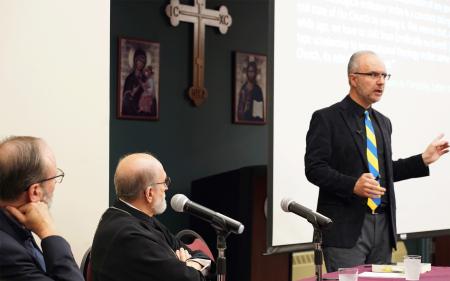
SEPTEMBER: Students, faculty, staff, and community members gathered in person and online on Sep. 12, 2023, to hear scholar and SVS Press author, Dr Paul Gavrilyuk, give a special talk on the contrasting leadership styles of two formational leaders of St Vladimir’s Seminary, Fr Georges Florovsky and Protopresbyter Alexander Schmemann.
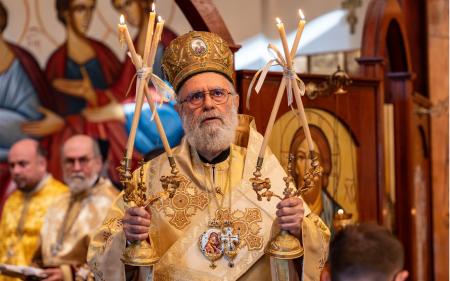
SEPTEMBER: His Eminence Metropolitan Saba, primate of the Antiochian Orthodox Christian Archdiocese of North America (AOCANA), made his first-ever pastoral visit to St Vladimir’s Seminary on September 28.
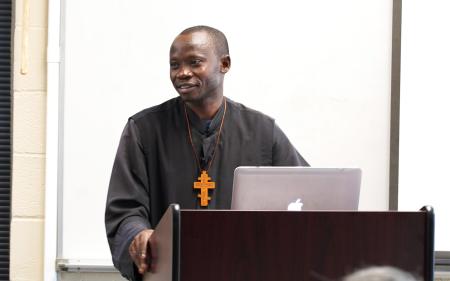
OCTOBER: In his first visit to St Vladimir’s Seminary since graduating, Fr Simon Menya (M.Div. ‘19) gave a presentation on the Orthodox mission he shepherds in Gulu, Uganda. Over 20 seminarians, faculty, and staff attended Fr Simon’s talk, hosted by the St Innocent Mission Society.
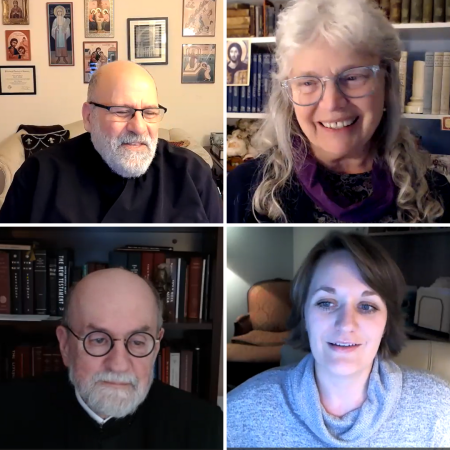
OCTOBER: St Vladimir’s Seminary hosted its inaugural session of the Light of the World Webinar Series on October 17 via Zoom live stream. Co-hosts His Grace Bishop John (Abdalah), Auxiliary of the Diocese of Worcester and New England (AOCANA), and Orthodox writer, Khouria Frederica Mathewes-Green, spoke at length on the topic “Submission to the Church: How to Become Children of the Light.”
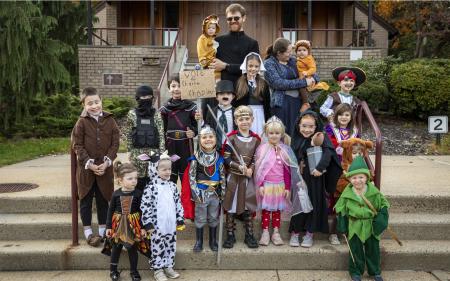
OCTOBER: Seminary families gathered for the annual Fall Festival, which included a chili cook-off, games and crafts, and a children’s costume contest.
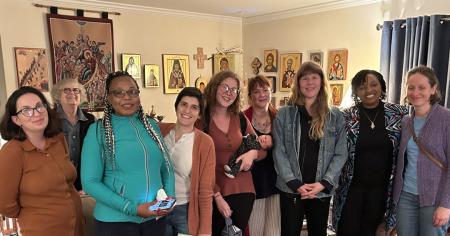
NOVEMBER: Seminary wives got together for a meeting of the St Juliana Society at Fr Chad and Mka Thekla Hatfield's house. The speaker for this meeting was Papadia Grace Attwa, the sister of current seminarian Job Njoroge (M.A. '25). Papadia Grace was born in Kenya and has lived in the United States for the last 8 years, and spoke to the St Juliana Society on "Finding Joy in Christ".
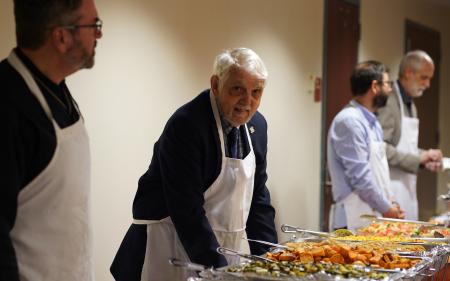
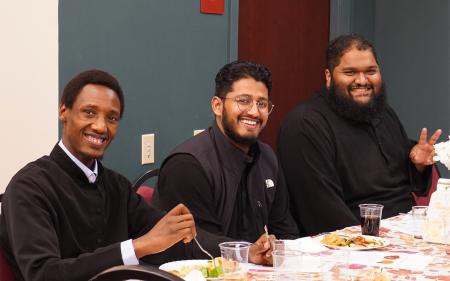
NOVEMBER: Faculty dish up Thanksgiving dinner for seminary students and their families, in a longstanding SVOTS tradition.
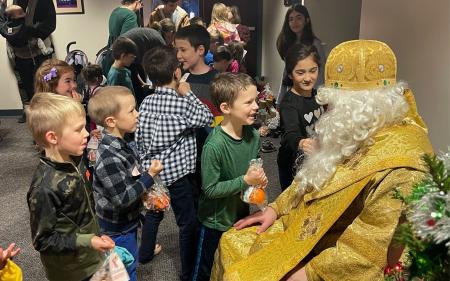
DECEMBER: Seminary children gathered at the Metropolitan Philip Auditorium for a special visit from St Nicholas (played by a seminarian)!
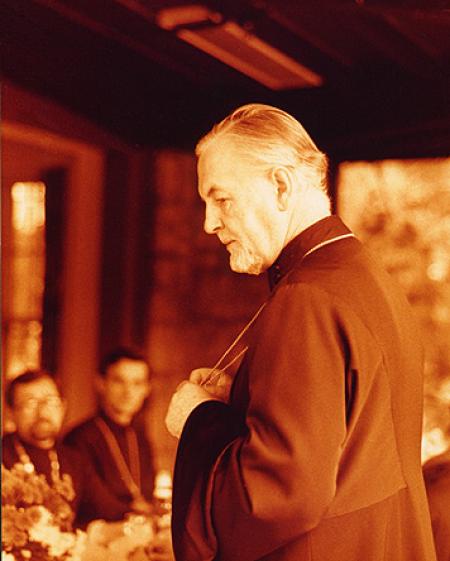
DECEMBER: On December 13, 2023, the campus community marked the 40th anniversary of the repose of Protopresbyter Alexander Schmemann, dean of Saint Vladimir's Seminary from 1962 until his death in 1983. May Fr Alexander’s memory be eternal!
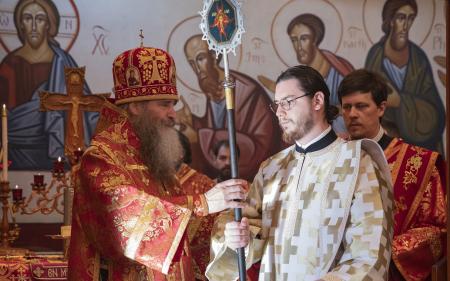
DECEMBER: In one of several ordinations held at Three Hierarchs Chapel this year, 3rd-year M.Div. student, Giorgi Lomsadze, was ordained to the holy diaconate by the hand of His Grace, Bishop Gerasim of Fort Worth, Auxiliary to the Diocese of the South (OCA), on December 13, the feast of St Herman of Alaska. Axios!
Diocese of the South Seminarian Ordained to Diaconate in Three Hierarchs Chapel
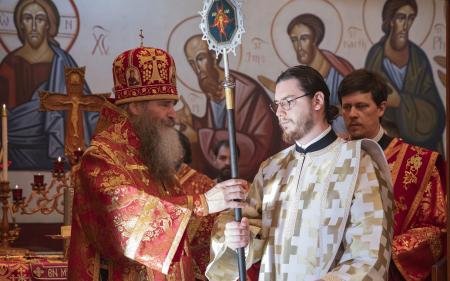
The St Vladimir’s Seminary community was blessed with a hierarchical visit from His Grace, Bishop Gerasim of Fort Worth, Auxiliary to the Diocese of the South (OCA), for the feast of St Herman of Alaska on December 13, 2023. His Grace presided over Vigil on the evening of Wednesday, December 12, and the Hierarchical Divine Liturgy the following day in Three Hierarchs Chapel.
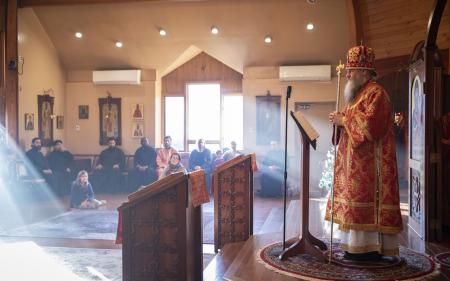
During the Liturgy, His Grace ordained seminarian Giorgi Lomsadze (M.Div. ‘24) to the diaconate, reading the first ordination prayer in Georgian, Dn Giorgi’s native tongue. His Grace was warmly welcomed by Seminary President, the Very Rev. Dr Chad Hatfield, who thanked him for his in-depth homily on St Herman on his feast day.
Also in attendance were the Very Rev. Marcus Burch, Chancellor of the Diocese of the South (OCA), and OCA Metropolitan Council member the Very Rev. Justin Patterson.
After the conclusion of the Divine Liturgy and diaconal ordination, the seminary community commemorated the 40th anniversary of the repose of former dean, Protopresbyter Alexander Schmemann, with a solemn panikhida service.
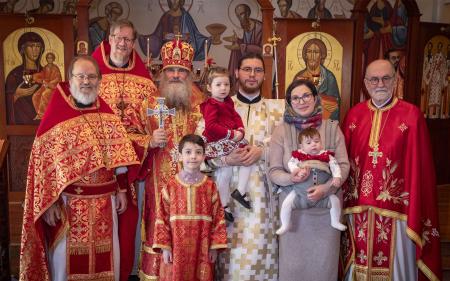
Congratulations and many years to Dn Giorgi and his wife Barbare! Axios!
Divine Liturgy
Third Webinar in Light of the World Series Illumines Practical Approaches to Grief According to Scripture and Church Life
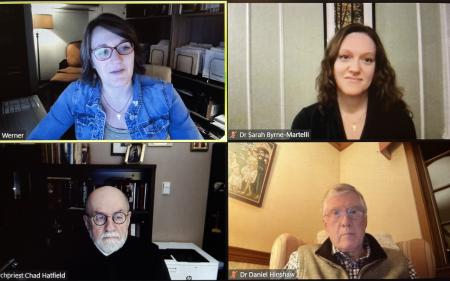
The third session in the Light of the World Webinar Series was co-hosted by Dr Daniel Hinshaw, SVS Press author and Professor Emeritus of Surgery at the University of Michigan School of Medicine, and Dr Sarah Byrne-Martelli (D.Min. ‘19), author, grief coach, and Senior Chaplain for the Division of Palliative Care and Geriatric Medicine at Massachusetts General Hospital. This webinar was held on Thursday, December 14, 2023, from 7:00-8:30 p.m. EST, via Zoom livestream.
Dr Hinshaw’s presentation, titled “The Tension Between Anticipatory Grief and Joy for Orthodox Christians,” delved into the concept of kenosis, or self-emptying, as it relates to the common human experience of suffering as a result of loss, both of our loved ones and our own vitality and independence as we age and draw near to death. Dr Hinshaw gave scriptural and patristic examples to define kenosis as not merely a result of current or anticipated grief but ultimately as an opportunity, a joyful reminder of our journey towards the Kingdom. As Christians, our kenotic experiences enable us to turn away from distractions that obscure our soul’s search for God and Paradise.
Presentation slides, Dr Hinshaw
Following Dr Hinshaw’s presentation, Dr Byrne-Martelli affirmed the salvific potential of grieving as “one of the ways that we become fully human; a gift from God that we must actively receive…As we pursue our full humanity in Christ, with vulnerability and humility, we grow closer to God, the true Source of life.” Dr Byrne-Martelli went on to address some of the most troubling questions we deal with in our grief, such as how do we view death? Why would a terrible illness happen to someone who lived a good life? Does bad things happening to good people mean God doesn’t really love us? She also gave beautiful examples of grieving within the communal worship of the Church and provided a wealth of practical advice and useful phrases to use when dealing with grief of one’s own or that of a loved one.
Presentation slides, Dr Byrne-Martelli
Seminary President, the Very Rev. Dr Chad Hatfield, moderated the Q&A session following the speakers’ presentations, which included poignant questions from listeners about grief and loss within their own families. He thanked the speakers for addressing such a “timely topic”, saying, “This is an incredibly busy time of year for most of us, but it’s certainly not ‘jolly’ for those who have recently lost loved ones, or are facing their first Christmas without someone, so you have really developed a ministry that is significant–on behalf of the St Vladimir’s Seminary community, I thank you both.”
Chief Advancement Officer and webinar orchestrator, Sarah Werner, also thanked the speakers for their thoughtful and insightful talks and encouraged listeners to support the students at St Vladimir’s Seminary by making a donation to the scholarship fund at svots.edu/give.
To watch the recording of the third session of the Light of the World Webinar Series, “Darkness into Light: Working through Grief During the Holiday Season”, click the link below.
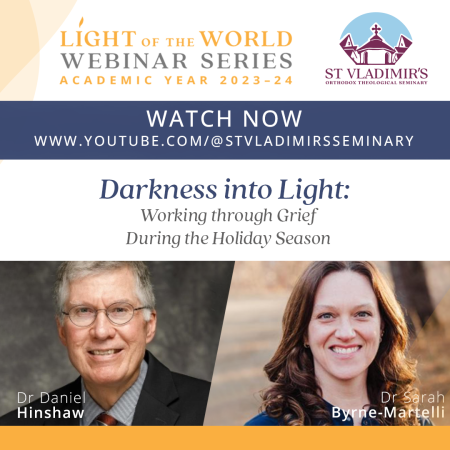
About the Light of the World Webinar Series
This monthly webinar series features speakers from among St Vladimir’s Seminary faculty, alumni, and friends, speaking on a variety of topics while answering a core question:
How are we Christians to be the light of the world?
Drawing inspiration from feedback received through a recent survey, these webinars aim to address a diverse range of themes that address real and pressing issues facing Orthodox faithful in modern society.
These online webinars are open to the public and free of cost. They are recorded and uploaded to the St Vladimir’s Seminary YouTube channel after the live Zoom event for easy access.
Armenian Delegation Visits St Vladimir’s Seminary
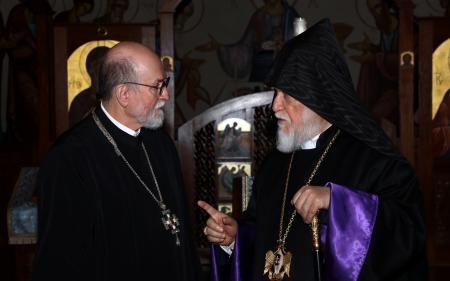
On Tuesday, November 21, 2023, a luncheon was hosted at St Vladimir’s Orthodox Theological Seminary (SVOTS), with honored guest His Holiness, Aram I, Catholicos of the Armenian Church Catholicosate of Cilicia, Antelias - Lebanon.
Seminary President, the Very Rev. Dr Chad Hatfield received the distinguished guests, remarking, “We were pleased to receive His Holiness Aram I, as well as representatives of the World Council of Churches (WCC), including alumnus Tony Kireopoulos (M.Div. ‘91) for lunch on campus. We received both an update on the current situation with the new wave of Armenian refugees who have been displaced by the recent war, as well as the WCC efforts in refugee relief.”
The delegation also included Fr Mardiros Chevian, Dean of St Nersess Armenian Seminary, as well as His Grace, Bishop Mesrop, Primate of the Eastern Diocese of America of the Armenian Orthodox Church.
Darkness into Light: Working through Grief During the Holiday Season
Join us for the third webinar in The Light of the World Webinar Series. This monthly webinar series features speakers from among St Vladimir’s Seminary faculty, alumni, and friends, presenting on a variety of topics while answering a core question:
How are we Christians to be the light of the world?
Drawing inspiration from feedback received through a recent survey we conducted, these webinars aim to address a diverse range of themes related to real and pressing issues facing Orthodox faithful in modern society.
The third webinar in the Light of the World Webinar Series is entitled: Darkness into Light: Working through Grief During the Holiday Season. It will be co-hosted by Dr Daniel Hinshaw, SVS Press author and Professor Emeritus of Surgery at the University of Michigan School of Medicine, and Dr Sarah Byrne-Martelli (D.Min. ‘19), author, grief coach, and Senior Chaplain for the Division of Palliative Care and Geriatric Medicine at Massachusetts General Hospital. This webinar will be held on Thursday, December 14, 2023, from 7:00 - 8:30 p.m. Eastern, via Zoom livestream.
The online webinar is open to the public and free of cost. It will be recorded and uploaded to our YouTube channel afterward for easy access. Click the button below to register and to receive the Zoom webinar link.
Registration is closed.
Commemorating 40 Years from the Repose of Protopresbyter Alexander Schmemann
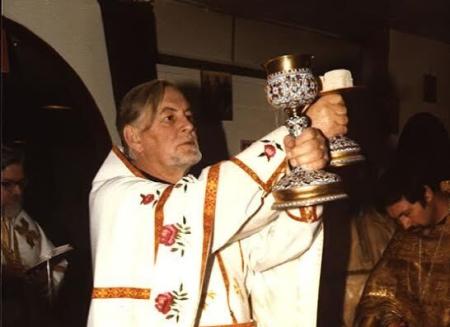
Wednesday, December 13, 2023, the Feast of St Herman of Alaska, marks the 40th anniversary of the repose of Protopresbyter Alexander Schmemann, dean of Saint Vladimir's Orthodox Theological Seminary (SVOTS) from 1962 until his death in 1983. Following the Divine Liturgy for the feast of St Herman, the seminary community will observe the milestone with a panikhida, as they remember his remarkable life and contributions, both to the seminary and to the development of Orthodoxy in America.
Fr Alexander’s impact on St Vladimir’s Seminary and Orthodox faithful around the world is difficult to overstate—our former dean and professor of liturgical theology remains beloved, revered, and widely read both in and outside the Orthodox Church to this day. On campus, Fr Alexander is continually remembered through assigned readings in classes, faithful commemoration on every Memorial Saturday, the dormitory on the north side of campus which bears his and Matushka Juliana Schmemann’s name, and frequent lectures related to his life and works, as well as the Annual Father Alexander Schmemann Memorial Lecture series. As we commemorate Fr Alexander on the 40th anniversary of his repose, we joyfully share with you ways to read and hear his words, learn more about his long-lasting contributions to the Church, and participate in his legacy.
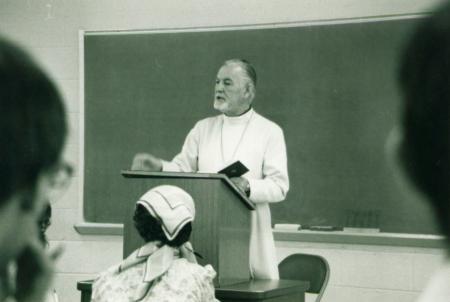
Books and recordings by Fr Alexander Schmemann:
Schmemann Speaks–a podcast featuring the words and wisdom of Fr Alexander Schmemann, from the St Vladimir's Seminary archives. His words—captured decades ago—are anything but dated. They are further proof that Fr Alexander remains a voice for our time.
The Schmemann Collection–the complete works of Fr Alexander Schmemann published by SVS Press.
“Discern the Spirits”–a video marking the 100th anniversary of Fr Alexander’s birth, featuring a recording of his stirring admonition to modern Christians on how to live in the world.
Fr Alexander Schmemann’s contributions to the growth and strengthening of the Orthodox Faith in America and beyond:
Fr Alexander Schmemann’s Leadership Role in the American Church–a comprehensive tribute to the important role Fr Alexander played at the early All-American Councils of the OCA and in Church administration and policy.
Serge Schmemann Reflects on Fr Alexander’s Life–Fr Alexander’s son, Pulitzer Prize-winning journalist Serge Schmemann, spoke in 2021 about his memories of his father and his mission.
Fr Alexander at St Vladimir’s Seminary–read the history of St Vladimir’s Seminary and its growth under the leadership of Fr Alexander during the 1960’s and ‘70’s.
In Remembrance of Fr Alexander–a profound reflection by Archpriest Alexander Garklavs (M.Div. '93) on Fr Alexander's life and the ways in which he influenced the Church in America and the lives of those who encountered him.
Participate in Fr Alexander Schmemann’s Legacy:
Fr Alexander Schmemann Legacy Society–support St Vladimir's Orthodox Theological Seminary with a bequest in your will.
Fr Alexander Schmemann Memorial Endowment–ensure future generations of Orthodox priests and lay ministers receive theological education at St Vladimir’s Seminary (select “Fr Alexander Schmemann Memorial Endowment" in the “I want to support” dropdown menu).
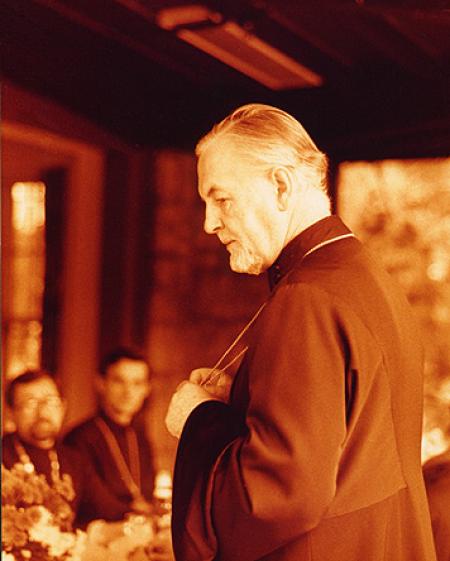
May the memory of Protopresbyter Alexander Schmemann (+December 13, 1983) be eternal!
In Memoriam: Archpriest Michael Oleksa
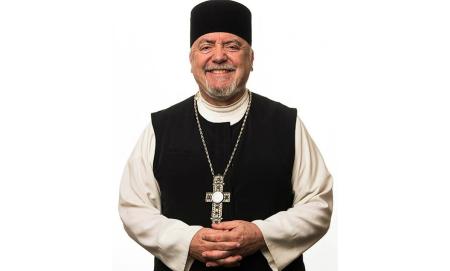
With faith in Christ and hope in the resurrection, we share the news of the repose of Archpriest Michael Oleska (M.Div. ‘73), who fell asleep in the Lord on the morning of November 29, 2023, after suffering a stroke. His Grace Bishop Alexei of Sitka and Alaska anointed Fr Michael with holy oil and administered last rites in the presence of his brother clergy and his family.
Fr Michael Oleska is well known as a missionary priest and student of Native Alaskan culture who dedicated decades of his life to the Orthodox Church in Alaska. He served as a priest in over a dozen Native Alaskan villages over the years. During his last 35 years in Alaska, he also served as a university professor and consultant on intercultural relations and communications, and authored several books on Alaskan Native cultures and history. A 1969 graduate of Georgetown University, he went on to receive a Master of Divinity degree from St Vladimir’s Orthodox Theological Seminary (SVOTS) in 1973. Fr Oleksa earned his doctoral degree in Presov, Slovakia, in 1988.
Fr Michael was a prolific speaker and church educator. His four-part PBS television series, Communicating Across Cultures, has been widely acclaimed. He recently joined Fr Nicholas Molodyko-Harris to speak about the recent canonization of St Olga of Alaska.
The recipient of numerous awards from local, state, and federal agencies, as well as the Alaska Federation of Natives, Fr Michael taught on all three main campuses of the University of Alaska system and at Alaska Pacific University as well.
Fr Michael authored two books published by St Vladimir’s Seminary Press, Orthodox Alaska: A Theology of Mission and Alaskan Missionary Spirituality; he also contributed many articles to St Vladimir’s Theological Quarterly.
Ted Bazil, planned gift officer and senior-most staff member at St Vladimir's Seminary, attended St Vladimir's as a seminarian with Fr Michael Oleksa in the early 1970s. He wrote the following reflection on his memories of Fr Michael, a lifelong friend.
“Fr Michael was destined for missionary work. During his first year as a seminarian in 1970, Fr Michael jumped at the open request of Metropolitan Theodosius, at the time the OCA diocesan bishop of Alaska, for any student from St Vladimir's Seminary to come to Alaska for the summer and work as a catechetical instructor in an Alaskan Native village. Fr Michael was assigned to instruct and lead the children and adults in Three Saints Orthodox Church in Old Harbor, AK, on Kodiak Island, where I later joined him.
Fr Michael's arrival in Old Harbor
Fr Michael teaching Old Harbor children
Fr Michael in Three Saints Orthodox church with children
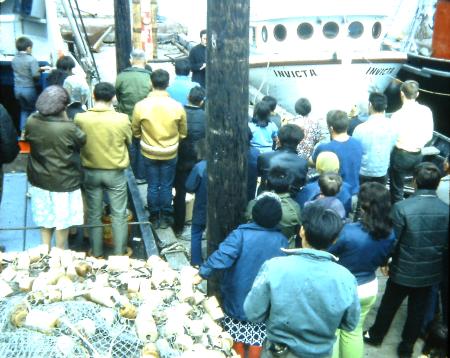
Fr Michael leading a service for the blessing of the fishing boats in Old Harbor
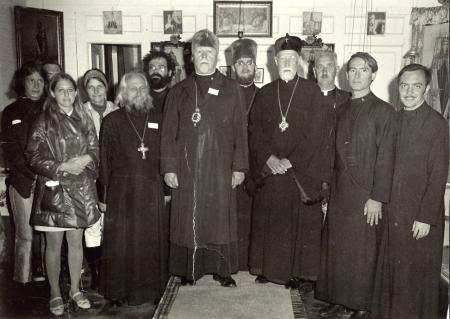
Photo taken during the canonization of St Herman in 1970 in the old chapel of Saints Sergius and Herman of Valaam on Spruce Island, after the first visit to the Island by OCA Metropolitan Ireney (Bekish) and Archbishop Paul of Finland, with clergy and pilgrims. Fr Michael is pictured on the far right, next to Ted Bazil; during the canonization, they were given liturgical and protocol assignments.
“These photos are merely a small snapshot of Fr Michael's first summer in Alaska. It was by divine providence that Fr Michael took up the fire and zeal of his faith after participating in the canonization of St Herman of Alaska at the end of the summer before returning to his studies with new-found exuberance and purpose.
“His example was followed by many other seminarians in the following years who went to Alaska to serve as diocesan missionaries and teachers at St Herman's Seminary in Kodiak. What distinguished Fr Michael is that he returned and stayed in Alaska until his repose, using his God-given talents to defend the faith and boldly lead others into the mystery of the Orthodox Christian Church.
"Fr Michael brought knowledge and joy to all who knew him. He was an inspiration to the people that he served and loved.”
At the time of his repose, Fr Michael was residing in Anchorage with his Yup’ik wife, Xenia, his daughter Anastasia, and one of his three grandsons.
All services for Fr Michael will be held at Saint Innocent Cathedral, 401 Turpin Street, Anchorage, AK, according to the following schedule:
Monday, December 4
3:00 PM Panikhida and viewing
Tuesday, December 5
10:00 AM Funeral Service
The burial will take place following the Funeral Service at Saint John Antiochian Cathedral in Eagle River.
May the memory of Archpriest Michael Oleksa be eternal!
Article adapted from orthochristian.com, froleksa.org, the Diocese of Sitka and Alaska Facebook page, and oca.org.
